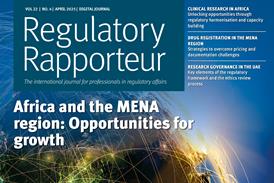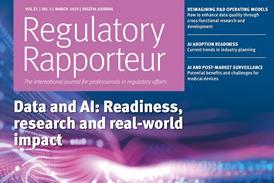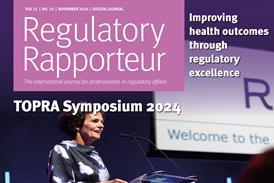All Journal articles
View all stories of the same content type.
-
 Journal
JournalRegulatory governance for medical research in the United Arab Emirates: A comprehensive overview
Since the country’s establishment in 1971, the United Arab Emirates (UAE) has strived for the continual progress and prosperity of the country and its people. This is reflected in the constantly improving research regulatory governance framework that encompasses both federal and local requirements. This article provides a comprehensive overview of the UAE’s research governance structure and highlights its requirements and applicable legislation, both at federal and local levels.
-
 Journal
JournalEssential steps for a successful notified body application in medical devices and in vitro diagnostic products
Navigating the notified body (NB) application process is a critical step for manufacturers seeking CE certification for medical devices under the EU Medical Device Regulation (MDR 2017/745) and the In Vitro Diagnostic Regulation (IVDR 2017/746). A well-prepared application can significantly streamline the approval process, reduce delays and ensure compliance with regulatory requirements.
-
 Journal
JournalMaking the move from regulatory affairs: Transferring your skills to the wider pharmaceutical industry
Career development is often discussed and is a personal journey impacted by an individual’s interests and skillset. Having made a transition from regulatory affairs into a commercial role, this article provides a personal reflection on the unique position that regulatory affairs has within a pharmaceutical company, enabling visibility and support across the entire product lifecycle and collaborating with a wide range of functions. The key to moving to roles outside of the regulatory profession is keeping an open mind to available opportunities across the industry.
-
 Journal
JournalDeciphering the regulatory landscape of MENA markets: Challenges in pricing and ancillary issues
The pharmaceutical market in the Middle East and North Africa (MENA) region is growing rapidly, offering vast opportunities for innovation and market expansion. However, navigating the regulatory landscape in this diverse and complex region presents unique challenges that pharmaceutical companies must address in order to create a value proposition.
-
 Journal
JournalA comprehensive analysis of drug pricing mechanisms and the regulatory framework in Morocco
Access to affordable medication is crucial for equitable healthcare systems, but balancing drug pricing and accessibility is challenging. Unaffordable drug prices are a global concern, affecting high-, middle- and low-income countries alike. Understanding drug pricing mechanisms in Morocco is essential for ensuring equitable healthcare access and system sustainability. This article provides a review of pharmaceutical pricing and reimbursement policies in Morocco, traces the historical evolution of drug pricing mechanisms, and explains their role in the drug registration process.
-
 Journal
JournalClinical research in Africa: Regulatory environment, challenges and opportunities
Africa is a destination for clinical research and its developments and growing potential should not be overlooked. There are benefits for those who intend to gain an understanding of the challenges and opportunities on this large and varied continent. Although the diversity of the people, cultures and regulations in Africa has an impact on complexity, there are numerous regulatory and harmonising organisations working to improve efficiencies, many of which require meticulous collaboration.
-
 Journal
JournalImmunological considerations in the development of novel vaccines
Part 1 of this series explored the elements of the immune response that are important to vaccine effectiveness. Part 2 looks at how understanding of the immune response supports prediction of vaccine effectiveness and can optimise clinical development of vaccines. The article then goes on to look at the impact of population diversity.
-
 Journal
JournalThe EU’s Health Technology Assessment Regulation: Overview and considerations for regulatory teams
The EU’s Health Technology Assessment Regulation (EU-HTAR) demonstrates a significant transformation in how health technologies are evaluated across EU member states (MS). The regulation, which came into effect on 12 January 2025, establishes a partnership between the European Medicines Agency (EMA) and national Health Technology Assessment (HTA) bodies through introducing joint clinical assessments (JCAs) and joint scientific consultations (JSCs).
-
 Journal
JournalUsing data to drive regulatory performance
Life sciences companies, whether they are pharma, biotech, MedTech or diagnostic, all aim to get products to patients as quickly and efficiently as possible. To do so, they rely on knowledge of their regulatory ecosystem (henceforth referred to as regulatory intelligence).
-
 Journal
JournalArtificial intelligence and post-market surveillance
Artificial intelligence (AI) is a force that is both feared and revered for promising revolutionary improvements in many fields. While tools like ChatGPT may create an impression of AI being easy to use, such wide AI applications are prone to hallucinations, or misleading information, and therefore can be dangerous in the context of post-market surveillance (PMS). The more accurate narrow AI tools for PMS do not yet exist, but hold a lot of promise for the future. The solution for effective PMS by AI will require restructuring data into appropriate formats for machine learning (ML).
-
 Journal
JournalAI adoption readiness: Current status and trends in regulatory organisations
There is no doubt that artificial intelligence (AI) and other advanced technologies (AT) will add significant value to global regulatory practices over time. However, it is still unclear how and when integration to a trusted level with attractive business benefits will be achieved for most organisations.
-
 Journal
JournalOrganising high quality research and development data for success
Regulatory functions have long discussed the quality of the data in regulatory information management (RIM) systems, and various data entry models have waxed and waned over the years. According to current research, there is no correlation between the data entry model and the quality of the data in RIM systems. However, this article argues that managing data in research and development (R&D) silos is the key reason for variable data quality across the R&D data value chain, and that a change in how R&D operations functions are organised could be the secret to success.
-
 Journal
JournalRegulatory strategy implications for foetal medicine
Regulation (EC) 1901/2006 is clear that paediatric investigation plans (PIPs) apply to children from birth to 18 years of age, which omits the unborn foetus. To understand whether any recommendations exist which would support seeking agreement on a PIP for this special population, a review of European legislation, guidelines and other application precedents was undertaken. This article summarises the review and provides insight into distinctions that may be made by the agency in this matter, as well as highlighting relevant precedents which were identified during the review.
-
 Journal
JournalImmunological considerations in the development of novel vaccines
This article explores the critical elements of the immune response that contribute to vaccine effectiveness, with reference to the European Medicines Agency’s (EMA) recent scientific guideline on clinical evaluation of new vaccines.
-
 Journal
JournalAn industry perspective on the use of patient experience data in medicines development: Is further action needed from European regulators?
Engaging with patients to understand their experiences, needs and preferences provides important information to sponsors of medicines development as well as to decision-makers, and integrating this information into every stage of medical product development can significantly enhance the therapeutic landscape for all stakeholders.
-
 Journal
JournalAn introduction to the Medical Device Single Audit Program
The Medical Device Single Audit Program (MDSAP) is an International Medical Device Regulatory Forum (IMDRF) scheme whereby the regulatory authorities of member jurisdictions have agreed to subcontract regulatory surveillance of the industry to existing notified bodies (NBs).
-
 Journal
JournalImplications of the EU’s AI Act for medical devices and in vitro diagnostic medical devices
The integration of artificial intelligence within healthcare has heralded a new era of innovation for medical devices and in vitro diagnostics. This article explores some implications of the EU’s AI Act for the existing regulatory frameworks governing MDs, specifically the Medical Devices Regulation (EU) 2017/745 and the In Vitro Diagnostic Medical Devices Regulation (EU) 2017/746.
-
 Journal
JournalThe EU Medical Device Regulation: Balancing innovation with regulation
The EU Medical Device Regulation (EU MDR) 2017/745 was introduced in response to the need for tighter regulation of medical devices (MDs) in Europe. However, with the increased regulatory burden, there could be potentially hundreds of unanticipated ramifications, particularly for smaller manufacturers and start-ups. By increasing regulation so significantly in a relatively short time period, the very rules which are designed to protect patients may prevent them from accessing the treatment they need and stifle innovation, as start-ups inevitably struggle under the weight of new requirements. This article assesses the delicate balance between innovation and regulation and analyses the relationship between the two.
-
 Journal
JournalThe role of artificial intelligence in regulatory affairs
This article explores the enormous potential of artificial intelligence (AI) technologies in regulatory affairs, highlighting how AI can streamline regulatory compliance, expedite submissions, enhance predictive analytics for decision-making, improve pharmacovigilance and elevate regulatory intelligence when properly applied. The discussion covers not only the advantages of AI but also the complexities of integrating AI into regulatory affairs, such as the challenges of algorithm interpretability, data quality, regulatory compliance, fairness, security, privacy and model accuracy. Additionally, it emphasises the collaborative efforts of the global regulatory community in developing guidelines and frameworks for the safe and effective use of AI.
-
 Journal
JournalOverview of chemical generics registration in China: Challenges for overseas applicants
This is the fifth article in a six-part series that focuses on the regulations in China’s drug market. There will be different topics each month with the initial focus on the drug master file (DMF) filing process followed by the drug registration process and pharmacovigilance requirements.



















